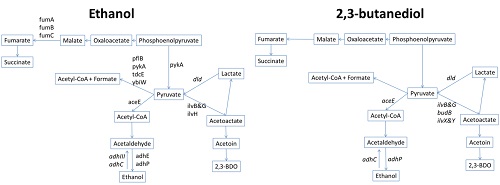System tuning using functionally-targeted gene alleles
The concept of system tuning is that behaviours can be engineered not only by altering the components from which the metabolic pathways are comprised, but also by the targeted modification of the activity of those pathways in selected locations, positively or negatively, to alter and optimize desired functions. Desired activities can be ‘turned up’ at one or more points in the appropriate metabolic pathways. Also, the activities of genes that have competing functions can be turned down. Including genes that could not be knocked-out without either lethal or other negative effects on the biological system being engineered.
As an example of this type of information genes that have different alleles (versions of the same gene) that strongly correlate (p<0.01) with the production of ethanol and 2,3-butanediol are illustrated below. Note, when a gene is identified in both figures this means that a different version of each gene is specifically associated with each behaviour. So, for example, the aceE associated with ethanol production is predicted to have relatively high activity, while that associated with 2,3-BDO activity is predicted to have relatively low activity.

The development of a methodology to determine functionally different versions of the same gene is also important because it provides a new way in which we can approach the study of the structural determinants of protein activities, which could ultimately provide a platform for the design of proteins with activities that exceed those which occur naturally.